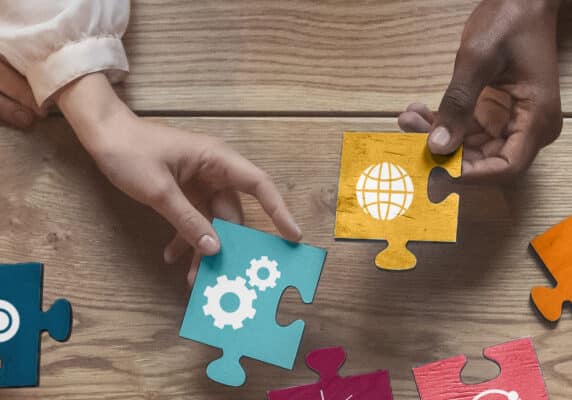Supporting Bond to shift power: meet our advisory group
Last month we published the first of two blogs from our recently launched Advisory Group which has been set up to help inform and shape Bond’s anti-racism, decolonisation and locally led work.
Bond’s new advisory group is made up of seven outstanding people representing feminist and youth movements, climate change and the diaspora community and are actively involved in networks on shifting power, decolonisation, and community-led development.
This week, we hear from another two members from the Advisory Group, Wanjiru Kanyiha, Executive Director for Kilimani Project Foundation and Nojus Saad, President and Chief Executive of Youth For Women Foundation.
What are you hoping the advisory group will be able to change for Bond?
Wanjiru: I invite Bond to begin to review the structures within which members operate, challenging language and funding structures. Bond should also challenge its membership to inculcate new inclusive ways of working and encourage co-design, co-creation, collaboration and co-investments with their partners. This will help Bond hold that space for their members as we transition into this new powerful way of thinking around development.
Nojus: I hope the Advisory Group will be able to transform and abolish remaining power imbalances within Bond internally at first, and then empower Bond UK along its stakeholders to embody the values of locally led development and inclusive rural leadership at the heart of their organisational structures. We want to reform and diversify the UK international development sector’s policies and external initiatives, so they include the experiences and skills of disadvantaged women and young people from rural, and refugee, and semi-urban communities at the core of decision-making processes within Bond and the sector at large.
What values and approaches for shifting power are you hoping to instil in Bond?
Wanjiru: The key value is inclusivity and seeing communities as asset holders, as rich in resources that can contribute to these conversations and contribute to how development is executed and rolled out within communities. Putting the community at the centre of this development work is central to shifting power.
Nojus: I want to support and empower Bond in bridging the historic rural-urban divide, particularly within the initiatives and investments of the UK’s international development sector. The marginalisation of rural and remote villages and communities by governments and international organisations forms the basis of the rural-urban divide worldwide, especially because economic and technological development and investment in those communities have traditionally been low a priority and restricted to local NGOs; which are already underfunded.
We notice this is called an “advisory group”, what do you think is the difference between being advisory and holding Bond to account? How would you try and bridge the gap between both?
Wanjiru: The basis of this group is built on trust because Bond formed this advisory group based on our lived experiences having worked in the development sector and having experienced firsthand the inadequacies of the flawed systems. This advisory group is the first step in holding Bond to account in the sense that listen, you came to us, we did not come to you, right? We need continuous communication and should co-design a feedback mechanism that allows the advisory group visibility into how Bond is implementing our advice.
Nojus: Bond’s inspiring to be locally led, grants our panel of locally led experts the opportunity to act not only as mere advisors but also as independent external evaluators and front-liners of ensuring Bond delivers its pledges for its vulnerable local communities.
As the youngest expert member of this Advisory Group, I can represent vulnerable Adolescents and Young People in this initiative, especially since we – young people from LMIC countries – have been and are still historically excluded from meaningfully shaping policies and international practices that are affecting our own health and human rights.
Becoming locally led as an anti-racist practice: a guide
Check out this toolkit designed to support your organisation shift its practice and use of power to become more locally led.
The guide supports international organisations based in higher-income countries, such as the UK, in partnership with colleagues from around the world, to shift their practice and use of power to become more locally led.
Get the guideWhat are the challenges and barriers faced when working to get a seat at the table in spaces traditionally dominated by northern organisation?
Wanjiru: The system does not allow you to be in the room, let alone the table. Part of this shift in power is to disrupt that system and to say, listen, the way you’ve been doing this has not been working, it cannot be business as usual. This is going to be difficult because it involves mindset shifting. We’ll get pushback and backlash in terms of the powers that be having to cede some of that power. This is a big challenge. The amount of distrust and cynicism that has existed between the ‘global north’ and the ‘global south’ means people might not jump with joy at these new ways of working.
Nojus: Coming from a small marginalised town in the most conflict-affected “third world” country (Iraq), while being a young person of color and belonging to a traditionally oppressed social group in my poor community – I have been discriminated against in the international community, from being rejected for multiple leadership opportunities to being deployed as a tokenistic symbol of youth engagement in multinational organisations.
I see the widespread racist, colonial mindsets especially when it comes to considering the global south as prosperous and evolving nations, rather than a pathological region that needs treatment.
Do you have any concerns about how previous advisory groups have functioned that you want to avoid whilst supporting Bond?
Wanjiru: We are cautious about how we approached the whole thing, taking all views into account, I think will really help in building trust and carrying these recommendations forward.
Nojus: Our intersectional identities should be viewed as our biggest strengths and not as a flaw or excuse for us to be sidelined in the conversations.
Many INGOs lack motivation or ambition for the cause that they stand for. They are only in the game because there is peer pressure from fellow INGOs, or role models like the United Nations and prominent governments like the UK; for a particular cause like locally led development. Or because the issue a trending topic and a popular practice among stakeholders to follow along, or especially they would engage for the sake of their reputation and competition for funding resources; of course they would want to be seen as inclusive, progressive, and charitable to raise their chances of further funding and business sustainability.
We need local people at the head and senior management of these INGOs. We also need to showcase evidence-based research on the long-term, cost-effective and substantial benefits when they deploy locally led policies.
How do you think other INGOs can hold themselves accountable to the communities they are supposed to serve? What advice would you give them?
Wanjiru: NGOs need to open themselves up, which is not an easy process. Beginning to change means interrogating how have we been working and asking, has it been effective? Have the structures we’ve built perpetuated the very things that we’re trying to fight? Have our systems perpetuated racism and bigotry and patriarchy, the things we’ve been trying to confront?
I would advise INGOs to stay true to the feedback they get. People are angry and cynical and unhappy with the current situation. Change is coming to the sector, whether they like it or not. So, be part of the transformative change we are seeking.
Say no to funding that is not really going to promote dignity or isn’t going to help you progress in the right direction. It might not take 2, 3, 4 or five years but the system is changing and they need to be part of that change.
Nojus: There are 3 key strategies that INGOs can deploy to embody the notion of locally led development, including having representation and inclusive leadership of young people, minorities, and the local stakeholders, strengthening the capacity of INGOs and their national members to conduct locally based public research examining the needs and struggles of the local communities they are working on, and don’t depend solely on international advocacy to shape policies and practices on locally led development, we also need grassroots local programs that implement those policies.




